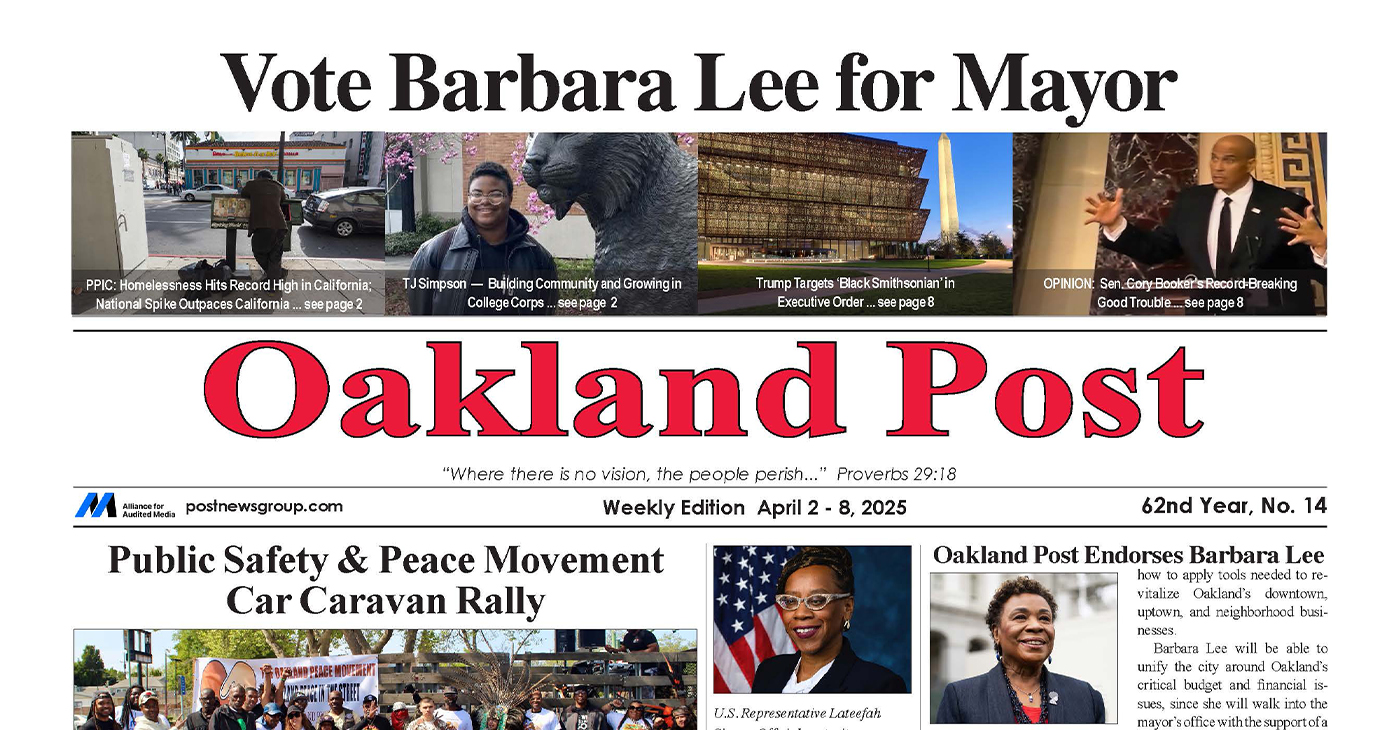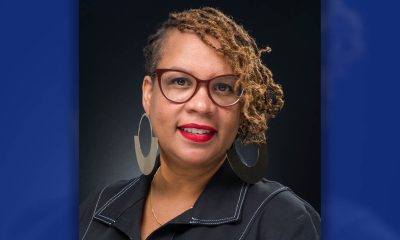National
Black Unemployment Rises
By Freddie Allen
NNPA Senior Washington Correspondent
WASHINGTON (NNPA) – After falling into the single digits in April, the Black unemployment rate increased to 10.2 percent in May, according to the latest jobs report from the Labor Department.
The national unemployment rate also increased from 5.4 percent in April to 5.5 percent in May. Most economists attribute the slight uptick in the jobless rate to the fact that more workers, nearly 400,000 by Labor Department estimates, entered the labor market last month. The national labor force participation rate, the share of the population that either has a job or is currently looking for one, crept up to 62.9 percent from 62.8 percent the previous month. The number of Blacks in the labor force also increased, but the participation rate was steady at 62 percent, compared to the White labor force participation rate, which rose from 62.8 percent in April to 63 percent in May.
The White unemployment rate hasn’t budged since February 2015 and in May it was still 4.7 percent. And while the share of the Black population that held a job, also known as the E-POP ratio, fell from 56 percent to 55.7 percent, the E-POP ratio showed a thin increase among Whites (59.9 percent in April vs. 60 percent in May).
The jobless rate for Black men over 20 years-old leaped a full percentage point from 9.2 percent in April to 10.2 percent in May and the participation rate for Black men decreased from 68.7 percent in April to 68.5 percent in May During the same period, the unemployment rate for White men fell from 4.4 percent to 4.2 percent in May. The labor force rate for White men was steady month over month at 72.2 percent.
The jobless rate and the labor force participation rate for Black women over 20 years-old didn’t budge in May and were 8.8 percent 61.9 percent, respectively. Meanwhile the unemployment rate for White women ticked up to 4.3 percent in May from 4.2 percent in April and the participation rate dipped to 57.3 percent from 57.6 percent in April.
Although economists often caution against drawing long-term conclusions based on one months jobs report, the Black jobless rate is still nearly double the national rate a trend that has continued for decades.
As the recovery continues, economists also continue to search for reasons why hourly wages haven’t improved more as the labor market tightens and the national unemployment rate falls toward pre-recession levels.
A recent report by the Center for Popular Democracy (CPD), a national group that advocates for social, racial and economic justice, pointed to Federal Reserve policies that seem to favor Wall Street over Main Street.
“The Federal Reserve’s focus over the past 35 years has been on price stability, or tamping down inflation,” said the CPD report. “While this focus is good for Wall Street, it has resulted in wage stagnation for most workers on Main Street.”
The report also said that wages have been stagnant or falling for the vast majority of workers since 2000.
The report continued: “While at the median, wages for white workers have risen only 2.5 percent in 14 years, African-American workers have seen a wage cut of 3.1 percent over the same period.”
The CPD report recommended that the Federal Reserve support policies that build a “full employment economy,” keep interest rates low for cities and states to encourage investments in infrastructure, and focus on policies that can help to grow a stronger middle class.
In a recent blog post on job growth and wages, Elise Gould, a senior economist at the Economic Policy Institute, said that if the economy added 280,000 jobs a month, the jobs gap would be closed by August 2016, but if the economy only added 207,000 jobs per month, the most recent three month average, “at that pace, we wouldn’t return to pre-recession labor market health until April 2017.”
In a statement about the Labor Department’s jobs report, Chad Stone, the chief economist for the Center on Budget and Policy Priorities, a nonpartisan think tank that studies how budget decisions affect low-income families, that even though many of the labor market indicators have recovered since the Great Recession, it’s still too early for the Federal Reserve to raise interest rates.
“By testing whether it can push unemployment lower — rather than play it safe to avoid any risk of inflation — the Fed could bring more workers back into the labor force, help more long-term unemployed find work, and begin to generate solid wage gains for most workers,” Stone said in the statement.
The Federal Reserve shouldn’t even think about raising interest rates until 2016, Gould said because the recovery is still lukewarm and wages are mostly flat.
Connie Razza, the director of strategic research for the Center for Popular Democracy (CPD), a national group that advocates for social, racial and economic justice, echoed those concerns.
In a press release about the jobs report, Razza said that unemployment among women and people of color is disproportionately high and that “many of those who have found work remain underemployed, underpaid, and unfairly scheduled.”
Razza continued: “Against this backdrop, the next steps for the Federal Reserve are clear. The Fed should keep interest rates low to let the economy continue its recovery, which will lead to more jobs and higher wages. This is the only monetary policy option that supports an inclusive recovery.”
#NNPA BlackPress
Lawmakers Greenlight Reparations Study for Descendants of Enslaved Marylanders
BLACKPRESSUSA NEWSWIRE — Maryland lawmakers have approved Senate Bill 587, authorizing the creation of the Maryland Reparations Commission.

By Stacy M. Brown
BlackPressUSA.com Senior National Correspondent
Maryland lawmakers have approved Senate Bill 587, authorizing the creation of the Maryland Reparations Commission. The body will study and make recommendations for reparations to descendants of enslaved people and others harmed by centuries of discriminatory policies. The legislation now awaits the governor’s signature and is scheduled to take effect July 1, 2025. The commission will examine Maryland’s long history of slavery, the economic and social systems that benefited from it, and the lingering impacts of those institutions. Its work will include recommendations on financial compensation, housing and business support, tuition waivers, and other forms of restitution. “This commission is not only about acknowledging our past – it’s about using that understanding to pave the way for a more equitable and fair future,” said Del. Jheanelle Wilkins, Chair of the Legislative Black Caucus of Maryland, which made reparations a top priority for the first time this legislative session.
From its founding in 1634 until the abolition of slavery in 1864, Maryland was a society built on slave labor. Tobacco, the colony’s staple crop, fueled economic growth and political dominance for the state’s elite. By the mid-18th century, nearly one-third of Maryland’s population was enslaved. Skilled and unskilled laborers like Frederick Douglass, who caulked ships in Baltimore, contributed to the state’s prosperity under brutal conditions. The legacy of that bondage continued to echo across generations. Del. Aletheia McCaskill, the lead sponsor of the House version of the bill, said the measure lays the groundwork for redress. “I am overjoyed at the passage of this monumental legislation,” McCaskill said. “This commission will gather historical evidence, examine present-day disparities, and provide a data-driven framework to acknowledge past harms. By recommending policies and developing solutions to repair the damage done, we can take meaningful steps toward true equity in our state.”
Sen. C. Anthony Muse, sponsor of the Senate version, called the passage historic. “We took a historic step towards justice and healing for our communities,” Muse remarked. “The passage of Maryland Senate Bill 587 marks a significant commitment to addressing the long-lasting effects of slavery and systemic inequities.” The commission’s membership will include lawmakers, historians, HBCU scholars, civil rights experts, representatives from the NAACP and the Maryland Black Chamber of Commerce, and members of the public. It will examine reparations programs in other states and recommend procedures for verifying eligibility and the feasibility of funding and distributing reparations. Maryland’s history makes it a powerful setting for this initiative. The state witnessed the forced transport of nearly 100,000 Africans during the 18th century. The rise of tobacco plantations led to a devastating regime marked by family separation, disease, forced labor, and systemic brutality. Enslaved individuals in Maryland built canals, smelted iron, and helped fuel the economic engine of the state while living under constant threat of sale or violence. The stories of individuals like Hillery Kane at Sotterley Plantation and Lucy Jackson at Hampton Mansion reveal not only the cruelty of slavery but also the resilience and resistance of the enslaved.
By the 19th century, Maryland became a central player in the domestic slave trade, with an estimated 20,000 people sold to cotton plantations in the Deep South between 1830 and 1860. Even after emancipation in 1864, freed Black Marylanders faced decades of disenfranchisement, segregation, and economic exclusion. “This is about more than history,” Wilkins said. “It’s about how that history has shaped the realities of today.” The commission will submit a preliminary report by January 1, 2027, and a final report by November 1, 2027. It will explore possible sources of funding, such as businesses and institutions that benefited from slavery and discriminatory government practices.
Opposition to the bill has centered mainly on its cost, but the fiscal note details only a modest increase of $54,500 in 2026 to fund contractual staff. No reparations payments are authorized under the current bill. Maryland is joining California, Colorado, Illinois, Massachusetts, and New York in forming a reparations commission. The move comes as diversity, equity, and inclusion initiatives face increasing national scrutiny and political attacks. Still, supporters of the commission insist the time for reckoning is now. “We’re not just commemorating the past,” McCaskill said. “We are charting a course toward justice, informed by our truth and grounded in our responsibility to future generations.”
#NNPA BlackPress
Harris, Obama, and Booker Step Up as Resistance Against Trump Takes Shape
BLACKPRESSUSA NEWSWIRE — Obama, meanwhile, broke his silence during an appearance at Hamilton College in New York, offering one of his sharpest public critiques yet of Trump’s second administration.

By Stacy M. Brown
BlackPressUSA.com Senior National Correspondent
Is the resistance finally taking form?
As Kendrick Lamar asked during his powerful Super Bowl performance, “Are we really about to do it?” That question now echoes in the political arena as former President Barack Obama and former Vice President Kamala Harris have entered the public fray, joining voices like New Jersey Sen. Cory Booker and Texas Rep. Jasmine Crockett in confronting President Donald Trump and his administration’s sweeping changes head-on. After months of relative silence following her defeat to Trump last November, Harris returned to the spotlight Thursday during a rare appearance at the Leading Women Defined conference at a seaside resort in Dana Point, California. According to The Los Angeles Times, she didn’t mention Trump by name but spoke forcefully about the anxiety many Americans are experiencing under his new administration.
“There is a sense of fear that is taking hold in our country, and I understand it,” Harris said. “These are the things that we are witnessing each day in these last few months in our country, and it understandably creates a great sense of fear. Because, you know, there were many things that we knew would happen, many things.” “I’m not here to say, ‘I told you so,’” she continued. “I swore I wasn’t going to say that.” The appearance marked a shift in tone for Harris, who has been weighing a potential run for governor of California in 2026 or waiting until 2028 for another shot at the presidency. Still, she clarified that her political silence hasn’t equated to surrender. “We can’t go out there and do battle if we don’t take care of ourselves and each other,” Harris told the crowd. “I’ll see you out there. I’m not going anywhere.”
Obama, meanwhile, broke his silence during an appearance at Hamilton College in New York, offering one of his sharpest public critiques yet of Trump’s second administration. He condemned Trump’s attempts to reshape the federal government, stifle dissent, and punish those who oppose his policies. “So, this is the first time I’ve been speaking publicly for a while,” Obama said. “I’ve been watching for a little bit.” “Imagine if I had done any of this,” Obama added. “It’s unimaginable that the same parties that are silent now would have tolerated behavior like that from me or a whole bunch of my predecessors.” While calling Trump’s proposed tariffs bad for America, Obama said his larger concern lies with what he described as the White House’s alarming overreach.
“I’m more deeply concerned with a federal government that threatens universities if they don’t give up students who are exercising their right to free speech,” he said. “The idea that a White House can say to law firms, if you represent parties that we don’t like, we’re going to pull all our business or bar you from representing people effectively. That kind of behavior is contrary to the basic compact we have as Americans.” Obama, who campaigned for Harris during the final stretch of the 2024 election, had warned that a second Trump term would endanger the nation’s democratic norms. “Just because [Trump] acts goofy,” Obama said at the time, “doesn’t mean his presidency wouldn’t be dangerous.” With Trump’s second term underway, the voices of resistance are growing louder.
Sen. Cory Booker added fuel to the movement by making history on the Senate floor. He delivered a 25-hour, 5-minute filibuster that broke the record previously held by segregationist Sen. Strom Thurmond. Thurmond’s 1957 filibuster—lasting 24 hours and 18 minutes—was aimed at blocking the Civil Rights Act. Booker used his record-breaking speech to denounce what he called a deliberate dismantling of government at the hands of Trump, Elon Musk, and Congressional Republicans. “It always seemed wrong,” Booker said, referring to the Senate room still named after Thurmond. “It seemed wrong to me when I got here in 2013. It still seems wrong today.”
The New Jersey senator, a descendant of both enslaved people and slave owners, framed his marathon speech as a moral plea, reading letters from Americans affected by deep cuts and policy threats to Medicare, Medicaid, Social Security, and SNAP. “This is a moral moment,” Booker declared. “It’s not left or right; it’s right or wrong.” With Booker’s record-setting stand, Harris’s reemergence, and Obama’s warning shots, what once felt like fragmented frustration among Democrats may now be coalescing into something more deliberate: a resistance that is finally, visibly, on the move. “I’ll see you out there,” Harris said. “I’m not going anywhere.”
Activism
Oakland Post: Week of April 2 – 8, 2025
The printed Weekly Edition of the Oakland Post: Week of April 2 – 8, 2025

To enlarge your view of this issue, use the slider, magnifying glass icon or full page icon in the lower right corner of the browser window.
-

 Activism2 weeks ago
Activism2 weeks agoWe Fought on Opposite Sides of the Sheng Thao Recall. Here’s Why We’re Uniting Behind Barbara Lee for Oakland Mayor
-

 #NNPA BlackPress2 weeks ago
#NNPA BlackPress2 weeks agoRev. Dr. Jamal Bryant’s Black Church Target Boycott Mobilizes 150,000
-

 Activism3 weeks ago
Activism3 weeks agoSan Francisco Is Investing Millions to Address Food Insecurity. Is Oakland Doing the Same?
-

 #NNPA BlackPress2 weeks ago
#NNPA BlackPress2 weeks agoRecently Approved Budget Plan Favors Wealthy, Slashes Aid to Low-Income Americans
-

 Activism2 weeks ago
Activism2 weeks agoFaith Leaders Back Barbara Lee for Mayor, Criticize Candidate Loren Taylor for Dishonest Campaigning
-

 Activism3 weeks ago
Activism3 weeks agoOakland Post: Week of March 12 – 18, 2025
-

 Activism2 weeks ago
Activism2 weeks agoGroup Takes First Steps to Recall District Attorney Diana Becton
-

 #NNPA BlackPress3 weeks ago
#NNPA BlackPress3 weeks agoPRESS ROOM: The Urban One Podcast Network Announces Los Angeles Wildfires Podcast, ‘Altadena: After the Fire’


























































